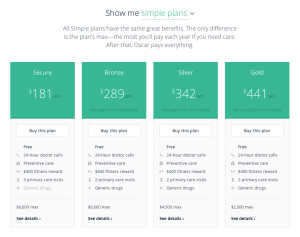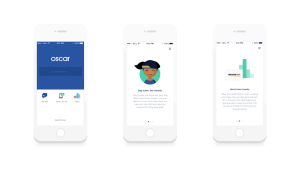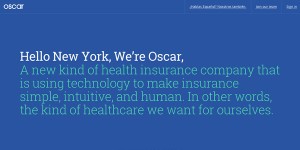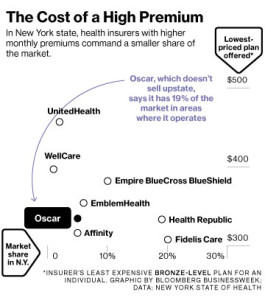Oscar – Taking on Giants – Health Insurance 2.0

Oscar health is a innovative healthcare insurance company focusing on the Internet era.
Oscar, a health insurance company based in New York, has set itself a seemingly unachievable goal. Take on health insurance companies like United Health or Aetna. The question is, can it do it? It looks like, because of its new integration between business and operating models, it can.
http://www.youtube.com/watch?v=4-ehZRFYOfk
Business Model:
There is nothing strikingly new in Oscar’s Business model, as we compare it to its health insurance competitors. The way Oscar is set to create and capture value is pretty much set by a subscription model of insurance.
Oscar charges its costumers a yearly fee that varies according to the kind of costumers. The company uses a risk assessment algorithm to set its price. The amount each costumer pay is directly related to age, income, geography and range of coverage. For instance, a 29-year-old, middle class, New York based patient can choose among 5 different prices or plans.
Once you signed for a you get access to a network of health providers that you can go to. Once you have a condition and go to one providers of their network you either pay (and later get a deductible) or Oscar cover the expenses for you if you have reached your out of pocket limit.
https://www.youtube.com/watch?v=4-ehZRFYOfk
Nothing new so far. What differentiate Oscar’s from its competitor is all the technology enabled features that it offers to its clients. For instance, Oscar offers telemedicine call through its platform at no cost for general conditions. Also, by integrating with a lot of other healthcare technology software the company can help patients keep track of their medicine’s schedules, reminding through Oscar’s app, when you have to take your pill. Also, Oscar can keep a log of your information, such as clinical exams or either health notes from doctors, online and available to its clients.
Above that, Oscar is targeted to individuals instead of groups, unlike it peers.
Operating Model
Oscar is a healthcare insurance company operating as a technology company. The company has 45+ engineers working to better build tools for costumers, such as a matching system between doctors and patients.
The company works in a way to bring full transparency to its costumers. With that, comes the effort the company puts in presenting everything very in a very friendly user interface.
Also, since the company is technology centered, it focuses R&D to integrate with lots of other health company. For instance, the company integrates its CRM to a wearable watch that tracks user’s physical activity. By doing that, it offers discounts to costumers who exercise. The rational, is based on the idea that people who exercise have a lower risk of getting sick, so it drives down Oscar’s cost, which in turn, give a discount to its patient.
The company, also aligns its marketing strategy to its target customers market. By advertising in highly metropolitan areas and doing so with gimmicky ads, it attracts younger and technology savvy costumers. That in turn, reduces the company risk and costs because that demography is known to have a lower risk of getting sick.
Conclusion
As seen, Oscar does a very good job of integrating a traditional business model with a completely new operating model. By doing, so the company has reached 40,000 costumers in less than 3 years and attracted lots of venture capital money. From its last fundraising the company is valued at more than 1.72 Billion Dollars.
References
https://www.hioscar.com/
http://blogs.wsj.com/digits/2015/09/15/google-bets-on-insurance-startup-oscar-health/
http://finance.yahoo.com/news/oscar-kushner-schlosser-healthcare-obamacare-affordable-care-act-november-1-160213075.html
http://bizbeatblog.dallasnews.com/2015/10/oscar-a-health-care-startup-brings-insurance-coverage-to-dallas.html/
http://fortune.com/2015/09/09/oscar-health-insurance-startup/
http://www.beckershospitalreview.com/payer-issues/oscar-health-s-app-enables-free-instant-communication-with-physicians-6-things-to-know.html
https://www.crunchbase.com/organization/oscar#/entity
http://www.bloomberg.com/news/articles/2015-09-03/for-health-insurance-startup-oscar-cute-ads-only-go-so-far








Very interesting case! Investors have taken a big bet on Oscar. You are absolutely right – Oscar seems to be more of a technology / product-driven company than a traditional insurer. I believe that the first years will be hard, as Oscar will compete with insurers that enjoy massive scale effects (eg when negotiating with provider networks on reimbursement). However, the fundamental thesis – help patients to engage more with their health through digital tools, and thereby help them live healthier (and save cost for the payor) – can help Oscar to develop a longterm, sustainable and substantial advantage. Also, it will be interesting to see if/how Oscar can leverage new insights to behavioural nudging to help its patients live healthier. All in all, I agree – health insurance is a field desperately in need of disruption!
It’s really interesting to think about the long-term sustainability of Oscar. As you mentioned David, a large part of its success to date is because their existing member base is largely comprised of a younger, healthier demographic. I wonder how they plan to adjust as this cohort ages. Perhaps members will cycle out once they get married and sign onto their spouses’ employee insurance plan and Oscar will forever be serving the younger demographics.
I also wonder how successful they will be in terms of tapping into the largest market of employer insurance programs for growth in the future. Member growth may also entail Medicare/Medicaid patients in the US, which are some of the costliest and sickest patients for the healthcare system.
Ultimately in order to be successful and differentiated from the other existing payors, Oscar must be able to show tangible cost-savings to those it contracts with and serves. The additions of telemedicine and activity tracker are appealing for those who are already engaged in their personal health, but what really matters is how the nurses can deal with the sickest patients and incentivize good behavior for those who traditionally have have not been engaged.